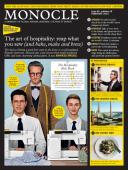
Issue 80
The art of hospitality: reap what you sew (and bake, make and brew). The basics of being a good host: start in the home or a well-equipped Finnish classroom. Monocle gets a few lessons from battle-hardened GMs and some charming ambassadors. A new Monocle special.
In This Issue
Oops! No content was found.
Looks like we no longer have content for the page you're on. Perhaps try a search?
Return Home

